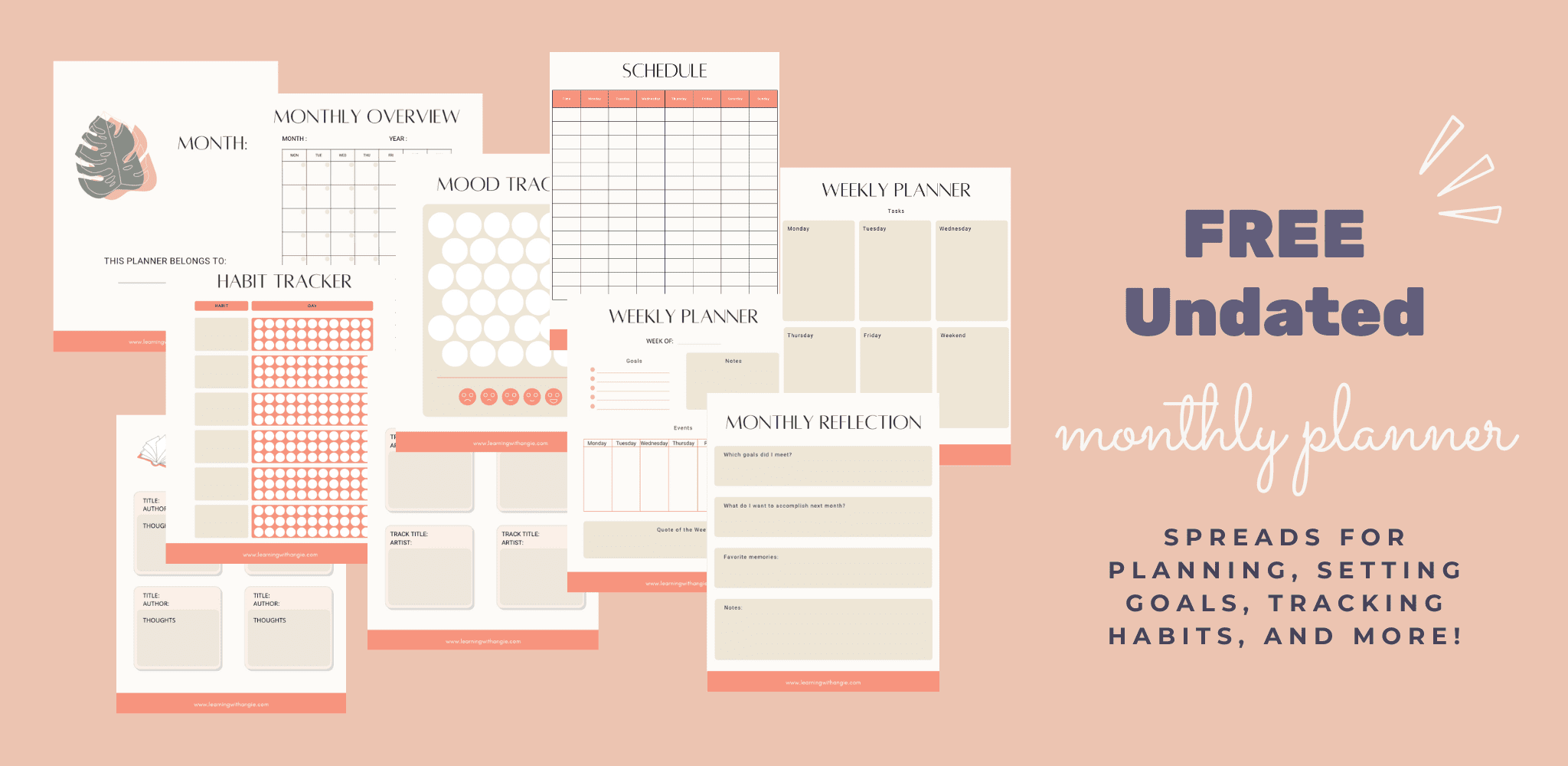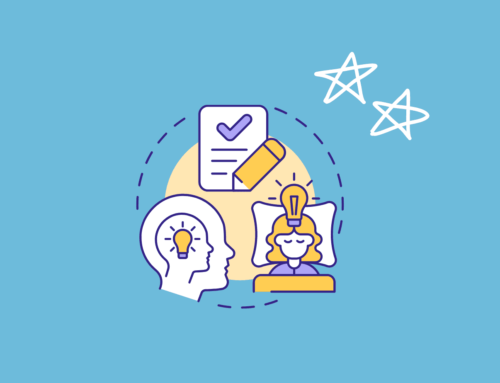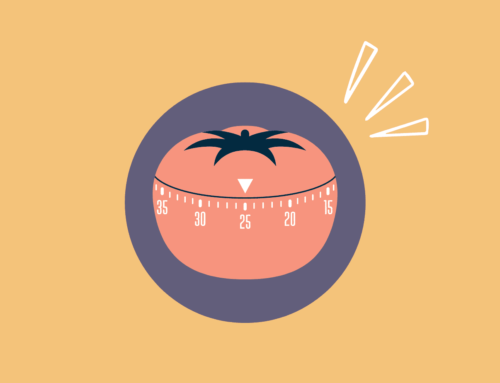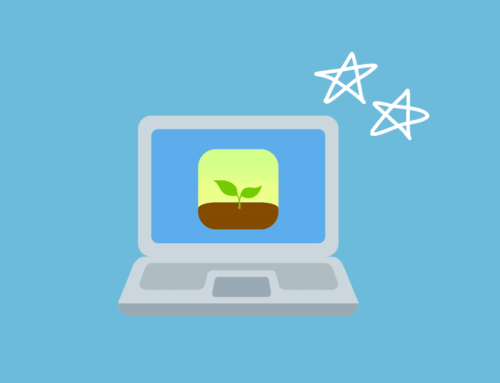

As students, we’ve probably all experienced these issues at some point:
- Feeling exhausted in the morning and unmotivated to work
- A midday crash, leaving you in want of energy for the rest of the day
- Giving in to the temptation of staying up late
- Not being able to fall asleep due to work-related stress

Fortunately, by following healthy morning to night routines for students, you can solve these issues and become more productive and organized every day.
In this post, I’ll be sharing my favorite routines throughout the day as a student. I’ve split them into three sections:
- A morning routine that prepares me for the day
- A midday routine that keeps me going
- A night routine that prepares me for another day of productivity
This post may contain affiliate links, which means that when you make a purchase through a link, I make a small commission at no extra cost to you.
Before we get into the routines, however, I want to emphasize why having routines is so important.
Importance of Daily Routines for Students (and Anyone)
1. Routines benefit your health
Good routines create structure in your life that keep you organized, thus reducing stress.
Additionally, you can include activities in your routine that directly benefit your health, like exercise or meal prep.
2. Routines make you more productive
Having routines frees up mental space to do more. It is the structure of routine that spawns focus and creativity.
For example, having a proper night routine prepares you for the next day. When you wake up in the morning, you don’t need to scramble to prepare for the day. Instead, you can start your day calmly, following a morning routine that energizes and refreshes you.
When you’re feeling groggy during the day, you can follow a midday routine that re-energizes you.

You see, each routine leads into the next, keeping up your momentum from day to day. That’s why you shouldn’t just have a fixed morning routine or a fixed night routine.
You need to have morning to night routines in order to get your life together and improve your well-being.
3. Routines are the key to success
Routines make the difference between those who succeed and those who don’t. This might sound like a stretch, but it’s true.
In Atomic Habits, James Clear writes that:
“If you can get 1% better each day for one year, you’ll end up 37 times better by the time you’re done. Conversely, if you get 1% worse each day for one year, you’ll decline nearly down to zero.”
If you don’t have a fixed morning routine yet, it doesn’t mean that you need to suddenly implement an hour-long morning routine. However, if you gradually add habits to your morning routine—wake up 15 minutes earlier, start making your bed, say one daily affirmation—it can make a big difference in the long run.
Here’s one of my favorite examples of how small improvements can lead to remarkable results:
In Atomic Habits, Clear talks about the massive improvement of the British cycling team. In the 20th century, the British team only won one gold Olympic medal and no Tour de France victories.
However, from 2007 to 2017, they won 178 world championships, 66 Olympic and Paralympic gold medals, and 5 Tour de France events.

So what did they change? Their incredible achievements were the result of small improvements that accumulated over time. Improvements like using higher quality mattresses and painting the inside of the team truck a different color.
Creating a fixed routine takes time to get used to, but it is 100% worth it. From feeling more organized and energized daily, you’ll also be able to work towards long-term achievements, like better grades and a healthier, happier lifestyle.
Morning Routine for Students
The first stop in this morning to night routine for students post is a morning routine that will make you feel refreshed, organized, and ready to tackle the day.
Ever experience mornings where you wake up exhausted and wish you could stay home instead? Me too.
However, by following this simple morning routine, I’ve been able to overcome friction and amp up my cognitive functioning in the morning.
1. Wake Up At the Same Time Everyday
Admittedly, this can be pretty hard. Especially on the weekends, it’s easy to sleep in and wake up over 3 hours later than you usually would.
While you may think you’re replenishing sleep deprivation during the week, you’re disrupting your circadian rhythm. Your circadian rhythm is composed of body signals that regulate when you sleep and wake.
If you don’t stick to a regular sleep-wake routine, you’ll experience worse sleep quality. This ultimately hurts your productivity and cognitive functioning.
Tips for Waking Up At the Same Time
- Get a sunrise simulator: A sunrise simulator is an alarm clock that simulates the brightening of the day. According to research, using one improves your mental clarity in the morning. I’ve used the Philips alarm clock for several years, but I’ve also included a popular cheaper option:
- Do something that excites you every morning: If you have a morning ritual that you look forward to, you feel more motivated to get out of bed. For me, this is putting in my earbuds and listening to upbeat music as I get ready.
2. Make Your Bed
While this simple habit only takes a minute or less, it can often feel like a hassle. Nevertheless, it is an essential one.
It gives you a sense of accomplishment first thing in the morning. Plus, it just looks better and helps you start the day feeling organized.

3. Get Dressed
I usually choose my outfit the night before. That way, I don’t expend energy thinking about what to wear in the morning.
Even on days when I don’t go anywhere, I still like to change out of my PJs. It helps me feel ready to tackle the day.
4. Follow a Hygiene Routine
This may look slightly different for everyone, but here are the steps I follow:
- Do my hair
- Brush my teeth (for at least 2 minutes)
- Wash my face (I prefer cold water because it wakes me up)
- Apply sunscreen
- Do light makeup
5. Meditate
Meditating is a great way to improve focus and feelings of calmness. If you’re just getting started, just one to two minutes of meditation can be beneficial.
You can follow short guided meditations on YouTube to bring your focus to the present and enhance mindfulness.
6. Drink a Glass of Water
The night before, I set a big glass of water on my nightstand. Right after I finish my hygiene routine, I drink it quickly.

After a night of sleep, it’s important to rehydrate your body. The many health benefits of drinking water on an empty stomach include:
- Flushing out toxins
- Boosting energy
- Increasing metabolism
I find that after drinking a glass of water, I feel more energized and ready to take on the day.
7. Get Moving
Movement gives you energy, which is why I like to include about 10-15 minutes of light movement in the morning.
Here are some ways to get moving and feel more energized:
- Follow a 10-15 minute full-body stretch or yoga video
- Go on a short walk
- Put on some upbeat music that makes you want to get up and dance
8. Journal
Morning journaling is a great way to organize your thoughts and emotions before officially starting the day.
(Click here to learn more about how to start journaling regularly.)

Here are some things you can write about in your morning journal entry:
- Positive affirmations, such as:
- I’m going to have an accomplished day
- I’m feeling strong and healthy today
- I’m excited for today
- Something you look forward to
- This can be something small, like meeting up with a friend or reading a favorite book
- What you plan to do
- I find that writing down what I intend to do gives me a greater sense of purpose
- How you want to feel at the end of the day
- Accomplished? Proud? Organized? Relaxed? During the day, visualizing how you want to feel at the end of the day keeps you going.
Here are the morning journal prompts I enjoy using to start my day on the right foot.
9. Eat the Frog
If it’s not a school day and I have time, I like to do something called “eat the frog”. Fortunately, this does not involve ingesting a four-legged amphibious creature.
It’s a commonly-used productivity strategy, in which you tackle the hardest item on your to-do list. This is an effective strategy because you have the greatest willpower in the morning.
Say you have a research paper you’ve been putting off. Put it at the top of your to-do list, and make it the first task you tackle in the day.
If it’s hard to get past the initial friction of starting work, use the two-minute rule for overcoming procrastination. This is where you tell yourself to work on something for two minutes. Once those two minutes are up, you’ll find that you’ve gained the momentum to continue working.

10. Eat a Nutritious Breakfast
It’s easy to neglect the importance of a nutritious breakfast. However, after a night of sleep, you need to replenish the nutrients in your body to feel energized.
Some of my recent favorites have been:
- Yogurt bowl with fruit and granola
- Oatmeal with fruit and nut butter
- Avocado toast with a soft-boiled egg (soft-boiled to the point where the yoke is still liquid but the whites are solid enough that you can assure yourself you won’t get salmonella)
11. Grab Everything You Need
The last (and most obvious) thing you should do before heading out is to grab everything you need. To prevent rushing and stress in the morning, you should already have packed your backpack, snacks, possibly lunch, and anything else you need.
Extra Tips:
Don’t use your phone or access social media and other distracting digital platforms in the morning.
This has been a life changer for me. I feel much calmer, organized, and ready to work if I don’t expose myself to digital distractions in the morning. I charge my phone downstairs so I don’t get tempted to use it.
If the weather’s nice, go outside and get a good dose of sunshine.

For example, you can journal outside or even eat your breakfast outside. According to this source, sunlight increases your serotonin levels. As a result, you feel more energized, as well as “calm, positive, and focused.”
Midday Routine for Students
More often than not, we all experience the midday crash, when we feel tired and want to be recaffeinated. I used to give in to the temptation of caffeine, but after learning that caffeine has a half-life of 6 hours, I’ve cut my intake after noon.
Unfortunately, post-lunch is usually when the energy crash hits the hardest. Luckily, you can implement some simple habits to rejuvenate your energy at midday.
1. Go On a Quick 15-Minute Walk
As I mentioned before, movement and sunlight exposure both increase your energy levels.
As counterintuitive as it sounds, the more you don’t move, the more tired you feel. The more you move, the more energetic you feel.
If you’ve spent most of the day sitting, going on a walk may be what you need to boost your energy levels.
2. Stand Up and Stretch
If you can’t go on a walk, stand up and stretch. Again, it’s important to get in some movement.
3. Stay Hydrated
Amongst other things, staying hydrated improves brain performance and boosts your energy levels.
I always keep a water bottle with me, so I remember to drink water frequently.
4. Eat a Healthy Snack

Sometimes, a quick snack is what you need to get your energy levels back up. However, it’s important to choose snacks that are nutritious, not processed foods that will sap your energy.
Here are some of my favorites:
- A handful of nuts
- Vegetables with hummus
- Fruit smoothie
5. Exercise
If you have time in between classes or after classes, make sure to do some moderate to high-intensity exercise. You can either follow a home workout video or go to the gym.
Exercise boosts your energy levels in the short and long term. Additionally, it promotes better sleep quality.
If you often feel tired during the day, lack of exercise could be the cause. Therefore, you should start exercising to feel energetic and become stronger, happier, and healthier.
Night Routine for Students
For the final stretch of this student morning to night routine post, I’ll be covering the night routine I follow every day. It is the same one from this school night routine post, where I cover each habit in more depth.

Having a healthy night routine as a student is essential. We like to think of each morning as the beginning of a new day. However, your success on any given day is determined by your actions the previous night.
If you don’t get enough high-quality sleep, your cognitive functioning will be compromised.
Here are steps I like to take to wind down before bed every night:
1. Organize Everything You Need the Next Day
This includes packing your backpack, double checking homework assignments, and packing a snack or two. You may also want to prepare your lunch if needed.
Also, prepare your outfit. The fewer decisions you have to make in the morning, the better.
2. Plan the Next Day
Create a to-do list of tasks you want to accomplish the next day. To make sure you have time for every task, time block your schedule (designate specific time blocks for specific tasks).

I find that planning the next day takes my mind off of work. That way, I don’t stay up at night from work-related stress.
Make sure to check out the planner app I use to not only plan my daily tasks but to organize nearly every aspect of my life.
3. Follow a Hygiene Routine
Everyone’s hygiene routine looks a little different, but in my opinion, these are the essential components:
- Remove makeup thoroughly (if applied).
- Have a skincare routine. Taking care of your skin is super important.
- Brush your teeth for at least 2 minutes. Then, floss.
4. Journal
Journaling at night is a great way to make sense of everything that happened during the day.
I find that answering certain journal prompts at night helps me feel more content and organized, as well as get better sleep.
5. Wind Down
Put away electronic devices at least half an hour before bedtime. The blue light emitted by electronic screens disrupts the production of melatonin, a hormone involved in sleep.
Here are some tips for getting rid of electronics before bed:
- Leave electronics outside of your bedroom, so it’s hard for you to get them
- Gradually increase the amount of time between accessing electronics and your bedtime (start at 5 minutes, then increase to 10 minutes, then 15 minutes, and so on and so forth)
- Put a book on your nightstand, which leads me into…

In addition to getting rid of electronics, reading before bed is effective for achieving a sense of relaxation.
If you aren’t in the habit of reading before bed, try placing a book on your nightstand. This makes reading an easy task to do right before bed.
6. Go to Sleep at the Same Time Every Night
Finally, just as it’s important to wake up at the same time every day, it’s essential to go to sleep at the same time every night.
Generally, you should be getting 7-9 hours of sleep every night. The exact amount varies from person to person. Personally, I find that 7 hours of sleep is just right for me. More or less than that makes me feel tired during the day.
Overview of Morning to Night Routine for Students
As students, it’s essential to follow established routines because of their direct role in our health, productivity, and success.
If you haven’t implemented routines yet, remember that it’s never too late to start. Also, remember that it’s okay to start small.
Even small routines like making your bed or preparing your outfit the night before can accumulate into something bigger. (1% improvement daily = 37x improvement by the end of the year!)

Again, I highly recommend getting a sunrise simulator to help you get up on time in the morning and start the day with greater mental clarity!
Lastly, while the morning to night routines I’ve detailed in this post are my favorite, you don’t need to follow them exactly. You can add or take away activities, based on your own preferences, as well as experiment with routines until you find one that suits you.
Nevertheless, I hope this post inspired you to start implementing daily routines in your schedule. Which of the activities in this post will you start doing? Let me know in the comments below!
Also, make sure to check out these other posts on productivity:
- How to Get Your Life Together as a Student
- All-in-One Aesthetic Planner App for Students
- 6 Crucial Tips to Live Life to the Fullest as a Teenager
- 11 Before Bed Journal Prompts for Better Sleep & Productivity
- How to Journal for Self-Growth + Self-Growth Journal Template
- 9 Guaranteed Ways to Overcome Procrastination

Learning With Angie is a place to share honest, unfiltered advice to promote student success. So if you’re a student (high school, college, or beyond) looking for tips on productivity, studying, personal growth, and more to reach your potential, this is the place! To read more about Learning with Angie, click here.


















